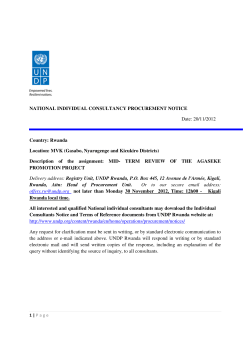
FORMER YUGOSLAV REPUBLIC OF MACEDONIA How to Build Open Information Societies 95
How to Build Open Information Societies A Collection of Best Practices and Know-How FORMER YUGOSLAV REPUBLIC OF MACEDONIA 95 Former Yugoslav Republic of Macedonia Former Yugoslav Republic of Macedonia 96 How to Build Open Information Societies. A Collection of Best Practices and Know-How FYR of Macedonia – Map & ICTD Country Profile UNDP Macedonia—ICTD Country Profile Macedonia, FYR Population (millions): Adult literacy rate (% ages 15 and over): GNI per capita (WB Atlas method, 2002, $): Telephone mainlines (per 1,000 people): Mobile phones (per 1,000 people): Personal Computers (per 1,000 people): Internet users (thousands): Human Development index rank (out of 173 countries, 2003): National ICT Strategy (Y/N): E-assessments (0,1,2...N): http://www.undp.org.mk 2.05 94 1,700.0 263 109 -34.2 60 No 1 ongoing UNDP staff in ICTD Matilda Dimovska - Programme Officer matilda.dimovska@undp.org Suzana Ahmeti - Programme Assistant suzana.ahmeti@undp.org Zoran Velickov - Project Manager zoran.velickov@undp.org.mk Zoran Janevski - Project Officer zoran.janevski@undp.org.mk Ljupco Mantev - LAN Manager ljupco.mantev@undp.org • International: Foundation Open Society Institute - Macedonia • National: Ministry of Local Self-Government; Sector for European Integration; Authorities of 19 municipalities; ZELS - the Association of the Units of Local Self-Government; National ICT Committee ICTD Activities • Information and Communications Technology Support for Municipalities in Macedonia US$ 737,077 – Provide computer training for the target groups, promote access to information technology in the municipalities and enhance electronic exchange of information and experience among local governments and their communities through training and electronic networking. In the long-term this will result in an improvement in the capacity of local government employees and the services they offer, expand networks at the local, national and international levels, and promote spread of ICT throughout the country generally • Local e-Governance in FYR Macedonia US$ 40,000 – Assess and provide comprehensive data on ICT capacity and infrastructure for all municipalities in Macedonia, which will form the basis of an Local e-Governance Plan. This latter will outline the steps needed to improve local government efficiency, effectiveness and responsiveness to citizens and businesses in line with the government’s policy of decentralisation. It will also contribute to the National ICT strategy and Action Plan • Local Governments Information Network – LOGIN US$ 30,000 – Facilitate the exchange of information through the use of Internet and traditional methods including seminars, publications, conferences, and training • Capacity Building Support for Consolidation of the National Aid Coordination System US$ 115,000 – Consolidates, manages, updates and reports information on foreign donor assistance to the country at the Sector for European Integration of the Government of Macedonia; In addition, facilitates the monitoring and analysis of external debt at the Central Bank Pipeline Programmes • Supporting the Macedonian Government, through the newly established National ICT Committee and its operations, in facilitating the development of information society and digital economy in the country, coordinating ICT activities as well as identifying linkages and complementary approaches. Note: Project is in its initial phase; website of the National ICT Committee has been published <www.kit.gov.mk> • Support for preparation of the National ICT Strategy and Action Plan – Implementation through supporting the research, consultation and formulation process of the national strategy documents, and coordination of support activities • Preparation for introduction of the one-stop-shop system for the business registration and licensing – networking of the organisations/databases involved in the process of company registration 97 Former Yugoslav Republic of Macedonia ICTD Partners Macedonian Municipalities get Wired Former Yugoslav Republic of Macedonia Anne Burke 1 98 Abstract ICT Recognised as a Driving Force In the context of overall ICT impoverishment – both in terms of access to technology and infrastructure, and in terms of practical skill levels – UNDP support for ICT development in the Macedonia has focussed on two projects. The first is to establish ICT centres and corresponding training programmes, and is aimed at three specific target groups: youth, the unemployed and municipal civil servants. In addition to other partnerships, including Foundation Open Society Institute Macedonia (FOSIM), the Information and Communication Technology Centres (ICTC) project was designed to capitalise on municipal government partnerships – one of the target beneficiaries for the project. The ICTC project has enjoyed high visibility and positive evaluations. Local government interest and support has been vital to the success and continuation of the centres, especially following termination of UNDP support after two years of project incubation. The second initiative, the Local e-Governance Project, now in a very early stage of implementation, further extends ICT benefits and reach via an ereadiness assessment and evaluation. It is anticipated that the assessment process undertaken by this project will work to identify and strategize Macedonia’s current and future ICT infrastructure as well as human capacity needs in moving toward information society goals. To encourage activities impelling Macedonia towards an information society and digital economy, in July 2000, the “e-Macedonia for all” initiative was started by President Boris Trajkovski. It was followed by the preparation of the “eDeclaration 2002”, a document with specific recommendations for accelerating development of an information society and digital economy in Macedonia, officially adopted by Parliament and recognised as a national priority, in July 2002. The Macedonian government has been actively involved in the eSEEurope initiative, under the auspices of the Stability Pact, which aims to better integrate the South Eastern Europe (SEE) countries into the global, knowledgebased economy. The latest document “eSEEurope Agenda for the Development of the Information Society,” adopted in October 2002, in Belgrade, has been accepted by the Macedonian government which is thereby committed to the Agenda items. One commitment is to adopt a National Information Society Strategy and Action Plan, based on the eSEE Agenda, and National Information Society Policies with clear goals, responsibilities and timelines for implementation by the end of October 2003. At the end of 2002, the government established the National ICT Committee charged with determining a National ICT Strategy and Action Plan which will establish development guidelines and priorities. Background Macedonia’s work toward developing adequate communications infrastructure and skills necessary to access and participate in the emerging global information infrastructure has been impeded by transition shocks and a poor economic climate. Poor material conditions preclude access to, and knowledge about, the Internet in many sectors of society. Computer resources remain insufficient and the Internet is generally inaccessible for most citizens due to relatively high costs. This situation particularly affects young people attending schools which are insufficiently equipped to teach and expand student’s IT skills. Afforded little opportunity to develop efficient and accountable management systems and good practice regarding public service, local authorities have begun to lag behind in terms of development stakes. In spite of this, in 1996 the Government initiated a process of decentralisation of local government. The municipalities have been limited in their policy and decision-making powers and have had limited control over resources. The new process of local authority reform currently underway is in preparation for transfer of competencies and financial resources, planned by the government in order to create sustainable and viable local governments in line with European standards. UNDP Offers Support The Information and Communications Technology (ICT) Assistance for Macedonian Municipalities and Sustainable Development, the first project in the ICTD area initiated by UNDP Macedonia, aims to promote access to information technology in the municipalities and to enhance electronic exchange of information and experience among local governments and their communities through training and electronic networking. In the long-term this will result in an improvement in the capacity of local government employees and the services they offer. Another project that has been specifically designed to support the government in its National ICT Strategy and to help strengthen the municipalities in the context of decentralisation, the Local e-Governance project, was initiated in September 2003. This project will advance ICT use for local government processes and services through the provision of detailed and comprehensive data on the existing ICT infrastructure and capacities in all Macedonian municipalities. How to Build Open Information Societies. A Collection of Best Practices and Know-How Macedonian Municipalities get Wired Municipal ICT Centres set-up the ICTC Project The immediate objectives of the ICT Centres project are to provide computer training for the target groups, strengthen information and communication infrastructure and networking of local governments nationally, and identify civil society and public/private companies and institutions that could contribute to ICT development. For the long-term, the project is designed to increase the capacity of local populations thereby improving their life prospects and economic opportunities, expand networks at the local, national and international levels, and promote spread of ICT throughout the country generally. A further objective is to facilitate Web-based provision of impartial, analytical and expert information about the development of reform and integrative processes in the country. Finally, it is hoped that support and capacity-building of national stakeholders will ensure the sustainable ICTenabled development necessary for full integration of Macedonia into the global information infrastructure. Working to achieve these goals UNDP, in partnership with the Ministry of Local Government,has established ICT centres (ICTCs) in 19 municipalities (see map in figure 1). Each centre has six computers, software packages, a printer, a fax machine and a connection to the Internet using ISDN lines.ICT training is given to members of pre-determined priority groups, together with the local government employees, by the two members of staff, the IT Manager and the IT Assistant. 99 There are three training programmes, the first of which is a package of basic courses which covers an introduction to computers and the most common applications in word processing and spreadsheets.The advanced course includes further techniques in MS Word and MS Excel, and an introductory course in MS PowerPoint together with Internet use, e-communication and Web design. The third programme, recently started, is based on the Xpert European Passport examination developed by the European Examination Centre (EEC) in Hanover. The target groups for this training have been selected with the help of the local mayors. Priority is given to employees in the local governments, youth, members of NGOs and the unemployed. The staff also makes recommendations and develops planning based on an ongoing assessment of project outcomes and results. For the future, there is the intention to provide a much larger range of services related to local egovernance, in accordance with the new responsibilities that will be transferred to the local level by the new Law on Local Self-Government. Web use is fostered by the ICTCs, and each centre will develop its own website. The Foundation Open Society Institute Macedonia (FOSIM) has contributed to this particular project element by assigning a third staff member to each centre,specifically to design and maintain the official webpages of the mu-nicipalities for a period of one year. Municipal websites serve as a channel for exchanges of information and experience among municipalities (see figure 3) and will be linked to the regional Local Government Information Network (LOGIN). Former Yugoslav Republic of Macedonia Figure 1 Geography of ICT centres For ICTC project financing, UNDP covers the costs for hardware and software, Internet connections and two staff members. The budget for this is the relatively small amount of USD 30,000 per site for a 24-month period, with municipalities providing fully furnished premises. The municipalities are also required to ensure continued ICTC operations for at least 12 months after UNDP financial support comes to an end. Former Yugoslav Republic of Macedonia A Case Study The ICTC in the municipality of Veles is a good example of a successful training centre lead by highly competent trainers. Veles is well-developed urban municipality, lead by an open-minded mayor. There was strong support from the local authorities for establishing the ICTC, particularly from the mayor himself. The project was promoted to targeted groups of users through newspapers, radio, TV news, etc. The trainees were then selected and the classroom and equipment were setup. Centre staff now provide training to the target groups and issue certificates upon successful completion of courses. The numbers of trainees that have been trained by the Centre on a yearly basis are as follows: 384 in 2001, 436 in 2002, and 112 in the first quarter of 2003.The success rate for completion of training programmes is at 90 percent. The centre has also developed an excellent webpage <www.undp.org.mk/itc-ve>. Following the two-year period of UNDP support, the Veles ICTC was recognised by local authorities as an official part of the overall municipal structure. For example, the ICTC staff work on defining potential uses for ICT in work processes and procedures involved in the provision of municipal services. tralisation. It will also contribute to the National ICT strategy and Action Plan. The project shares many long-term objectives with the ICTC project. An assessment of ICT capacity within the 124 municipalities will be carried out together with an in-depth analysis of six pilot municipalities. The study will be completed over a period of six months, having begun in September 2003, and the final report will be publicly presented through the Web portal making the information accessible to governmental units and civil society organisations. The methodology for the assessment process was designed and developed by UNDP. It will be used for the overall assessment process and also for the in-depth analysis. The methodology provides procedures for data collection and assessment indicators being used to identify the requirements for providing municipal services. Using comprehensive questionnaires for data collection and assessment, the process will help generate a set of specifications, functionalities and objectives, forming the basis for ICT development recommendations. Interviews will also take place in the pilot municipalities to enhance the quality of the assessment process. Measures of Success On a purely quantitative level the ICTC project has been a resounding success. Operations began with the establishment of three centres in 2000, expanding very quickly to 15 in 2001, and 19 in 2002. Over a four-year period (2000–2003) the project has trained around 16,000 people and the numbers have been gradually increasing in all the municipalities (see figure 1). The split between the three main categories of trainees (youth, the unemployed, and local government employees) is roughly even (33%, 30%, and 36% respectively – see figure 2). Women make up two-thirds of all trainees. The majority of municipalities have now launched their websites, providing information on ICTC training as well as for ongoing activities organised by the municipal authorities. 11% 0% 16% 3% 11% 12% 6% 6% 35% A scene from an ICT centre... Assessing the Municipalities – The Local e-Governance Project The main objective of the Local e-Governance project is to assess and provide comprehensive data on ICT capacity and infrastructure for all municipalities in Macedonia, which will form the basis of a Local e-Governance Plan. This latter will outline the steps needed to improve local government efficiency, effectiveness and responsiveness to citizens and businesses in line with the government’s policy of decen100 Pupils SME Local Government Students Public Enterprises NGO Unemployed State Administration Other Figure 2 Trained, by category Advantages for the direct beneficiaries of the whole process – local government employees,citizens and the training target groups – are numerous. The public has responded very well to the training opportunities with an impressive success rate of around 90%. The vast majority of trainees have achieved a good level of computer literacy which engenders improved job prospects as well as educational and business opportunities. Senida Ismaili, a 12-year old trainee at the Rostushe ICTC How to Build Open Information Societies. A Collection of Best Practices and Know-How Macedonian Municipalities get Wired 101 able to open and successfully run the courses. Because of all this, interest has been growing… Unfortunately, not all candidates are able to be accepted because of growing numbers of interested people and the small capacity.” The level of transferability of the ICTC project is relatively high, it could be replicated in other municipalities in Macedonia and also elsewhere in the region, it is not country-specific.The nature and the characteristics of the methodology and the concept of the questionnaires used in the Local e-Governance project could also be very easily used in E-readiness assessments not only for local authorities, but also for the authorities and institutions at a national level. The Future So what is the next step? The assessment report for the local e-Governance projects will contribute to the development of a National ICT Strategy to be administered by the National ICT Committee and will also lead to implementation of other development projects. Key problem areas will have been pinpointed and recommendations made as to the design of new, targeted policies and programmes pertaining to good governance and local development. The scope of ICTC activities will be expanded to ensure that activities are linked and integrated with other UNDP interventions at a local level. The project will also continue to work towards ICT potential being harnessed for increasing transparency and accountability of local governments, improving the interaction between local governments and citizens, as well as improving the level of service provided to local communities, particularly provision of services related to economic development. On a broader level, the ICTC and e-governance initiatives together with successive projects will result in an improvement in ICT usage and human capacity, will enhance transparency and accountability in local government and, ultimately, democratic processes in Macedonia. The path to decentralisation within local government will also run smoother. These projects will play a vital role in improving education and reducing poverty. ICT will remain firmly fixed on the national agenda ensuring that Macedonia becomes a player in the global information infrastructure. Lessons Learned Results of project activities (ICTCs) are subject to regular monitoring by the project staff, as well as by independent external consultants. External evaluations were undertaken to critically and objectively examine overall project accomplishments. The main lessons learned are: • political leadership and the proactive role of mayors is important for these type of initiatives; • local technical infrastructure should be adequate and meet the programme’s requirements. A lack of capacity in Rostuse, a rural area where local telecommunication infrastructure is weak, meant that access to the Internet had to be provided by a wireless system, which turned out to be expensive and complex in its operation; • competent project staff to provide expertise and guidance contributes towards successful implementation of the initiative; • encouragement of regular communication between ICTC staff leads to the creation of a community of managers Former Yugoslav Republic of Macedonia (rural area), bears witness to this: “I thought that computers were very difficult but now I do my homework very easily using a word processor. I love the Internet very much too.” Enhanced ICT skills for the municipal staff will undoubtedly enable them to provide better services under their current mandate and also to adjust to the forthcoming extension of their responsibilities planned under local government reform. The citizens will benefit in the long-term by having free access to local information that empowers them to participate in socio-economic development within their communities and to closely monitor the efficiency, transparency and responsiveness of local government services. On all levels, the project meets UNDP criteria for project success – does it ‘make a difference’ and, in particular, does it ‘bridge the ICT and digital divide?’. Further, the project is in line with Millennium Development Goals, through developing an ‘open training system that includes a commitment to good governance’ and by helping to ‘reduce poverty’ by enhancing trainee employability and helping develop business opportunities. For partnerships, the ICTC project attracted the interest of the Foundation Open Society Institute Macedonia which assisted in development and maintenance of municipal webpages. Some ICTCs are also funded directly by the aid agencies of various European countries, including: Norway (four centres), Sweden (three centres), and Spain, municipality of Torrevieja (one centre). Additionally, some national and international organisations and projects use ICTCs services, for example, the European Agency for Reconstruction (EAR) in Veles and the Ecology Organisation in Kriva Palanka. Vesna Dejanovska, member of this NGO, underlines the centre’s relevance to her organisation, “This ICT Centre came at the right moment for us. We were wondering how to promote the activities of our organisation but now, on the ICT Centre website there is information posted about us and everybody can find out more about our organisation.” One of the best indicators of future sustainability is the satisfaction of the main partners and project beneficiaries – in that success breeds success. All parties involved on the ground in the ICTC project are satisfied and keen for the project to continue. Within the municipal offices there is an awareness of improved administrative and management processes, an increase in reputation and level of recognition, and a higher satisfaction on the part of employees and service users. Subi Jakupi, a local government employee in Gostivar stated, “ To be more efficient at work is the reason why many of us are interested in advanced information technology.” He is also aware that he now has greater job opportunities,“The computer skills I will gain from the training at the Centre will help me to be more competitive in the job market. These days you have to know computers in any occupation.” There is also awareness within the wider community of the project’s importance. The Nova Makedonija newspaper, on the occasion of the Rostuse ICTC opening in July 2000, reported,“This project is of notable value to the municipality of Rostuse, because it will help the young to a path of productive aims and it will help build a sustainable community.” In the same newspaper an article appeared on 21 January 2001 on the increasing interest in and demand for the ICTC’s training courses: “Interest for the IT Centre in Kriva Palanka, financed by UNDP, is big… in a few months, the Centre’s goals will be met… Along with municipal support, the Centre was the existence of the UNDP-supported ICTCs contributes to increas-ed Internet access and computer literacy. UNDP Country Office Profile The UNDP mission in Macedonia is to provide leadership and advice to the government and the international community and to develop relevant programmes that can guide the country on the path to development and lasting peace. In the context of the recent developments in the country, UNDP has outlined the four strategic priorities (flagship programme areas): decentralisation, jobs, environment, and security. Development services are offered to different UNDP partners (government, donors, etc.) to strengthen national capacities for project implementation. LOGIN Web Municipality Forum NGOs Units of Local Self-government Former Yugoslav Republic of Macedonia interested in addressing the important issues for current and future activities. This is an asset for the future; • there is room to explore the relationship between the UNDPsupported centres and private companies offering training. While for the most part these two exist comfortably in parallel, a time may come when the relationship is more competitive; • creation of a virtual community using the Web has been supported by the centres, thus helping to override restrictions by limited access to computers and the absence of an active programme supported by the government to stimulate public dialogue; • improvement in the economic situation of the municipalities, and more competition between ISPs to reduce access costs, is needed to underpin significant expansion of computer and Internet use. Within this environment, Business orgs. Citizens Educational institutions -Infrastructure -Economic -Demographic indicators -Facilities and Services -International cooperation -City Plan Info -LG structure -Opinions -Business Plans -Initiatives -Lifestyle -News, etc Public enterprises Other Official Web Sites Information flow ICT Centre ICT Centre Municipal Desk Web Site Municipal Desk Web Site Figure 3 Graphical presentation of the Information and Communications Technology (ICT) Assistance for Macedonian Municipalities and Sustainable Development project 1 Anne Burke is currently working as a free-lance editor, proofreader and writer. In Ljubljana, Slovenia she was the assistant on an English language magazine, Ljubljana Life and was the language editor for the European Delegation’s monthly magazine. For a period of seven years in Ireland she worked in film and television – in production, administration and training. During that time Anne spent two years as the Executive Director of ‘Women in Film and Television’ a networking and training project funded by the EU’s NOW (New Opportunities for Women) programme. Prior to that Anne spent 11 years in France working as a computer auditor with Deloitte & Touche. 102 How to Build Open Information Societies. A Collection of Best Practices and Know-How
© Copyright 2025











